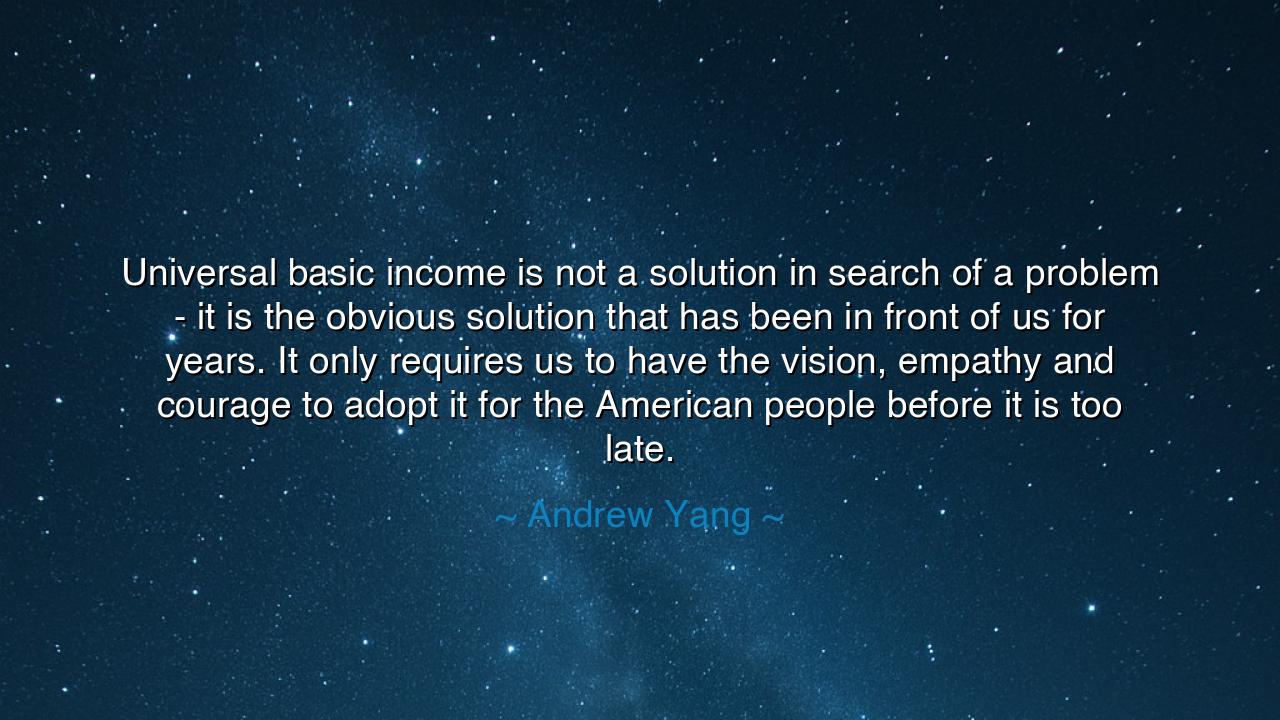
Universal basic income is not a solution in search of a problem -
Universal basic income is not a solution in search of a problem - it is the obvious solution that has been in front of us for years. It only requires us to have the vision, empathy and courage to adopt it for the American people before it is too late.






In the stirring words of Andrew Yang, a visionary who sought to awaken the conscience of a nation, we find a call to both reason and compassion: “Universal basic income is not a solution in search of a problem - it is the obvious solution that has been in front of us for years. It only requires us to have the vision, empathy and courage to adopt it for the American people before it is too late.” Here lies a recognition of a truth long ignored: that justice, security, and human dignity are not gifts to be earned, but rights to be upheld. Yang reminds us that solutions to the pressing problems of society are often simple in concept, yet require the boldness to act where others hesitate.
The origin of this insight lies in Yang’s engagement with the realities of the modern world. Observing the sweeping changes brought by technology, automation, and economic inequality, he understood that countless souls are left adrift, struggling for survival while the machinery of progress marches onward. Universal basic income, in his vision, is not a theoretical experiment, but a practical tool to restore balance, offering stability and opportunity to those left behind by forces beyond their control. It is an act of foresight, empathy, and courage — virtues as ancient as human civilization itself.
The meaning of Yang’s statement reaches beyond economics into the very essence of human society. To provide a basic foundation for life — food, shelter, opportunity — is not mere charity, but a recognition of shared humanity. The invisible suffering of millions is not a problem that awaits invention; it has been present for decades, quietly gnawing at the strength and spirit of the nation. Yet because it is slow, silent, and unglamorous, it is often ignored. Yang calls us to courage: to act upon what we know is right, even when the path is politically difficult or socially unfamiliar.
Consider the example of Franklin D. Roosevelt and the New Deal, a historical moment when vision and courage transformed despair into hope. Faced with the Great Depression, millions had lost their livelihoods, their homes, their very faith in the future. Roosevelt, guided by both empathy and reason, implemented policies that gave ordinary people a foundation from which to rebuild. Though controversial, the New Deal provided security, opportunity, and dignity, lifting the nation from the brink. Like Roosevelt, Yang sees universal basic income as a similarly bold act: a necessary measure that meets the challenges of a changing age with both practicality and moral clarity.
Yang’s words also illuminate a broader human lesson: the solutions that endure are not those invented in haste, but those that resonate with the needs of the many, that recognize the invisible burdens of society, and that act before the suffering becomes irreversible. To wait for perfection, for consensus, or for convenience, is to risk the erosion of human dignity itself. Courage is required not to create a new problem, but to confront a problem we already know exists and act decisively. Vision, empathy, and courage — these are the instruments of progress, as necessary today as they were in the councils of Athens or the assemblies of Rome.
Even in smaller realms of life, the principle holds: the needs of others are often visible to those with eyes to see, yet action requires bravery. The teacher who ensures a struggling student receives attention, the doctor who fights bureaucracy to provide care, the neighbor who extends help without expectation — all reflect the same courage Yang calls for on a national scale. Empathy without action is hollow, vision without courage is impotent. True leadership, and true happiness of a society, arises when knowledge, compassion, and bravery converge in a decisive act.
The lesson, then, is twofold: first, to recognize the challenges that confront us, and second, to act upon them with boldness, empathy, and imagination. Universal basic income is a metaphor for all acts of foresight and care — the choice to ensure that human life is honored, even when the solution is difficult or unconventional. It asks us to transcend fear, inertia, and cynicism, to embrace a vision of society where dignity and opportunity are not privileges for the few, but the birthright of all.
So, my child, carry Yang’s wisdom into your heart: see the solutions that lie before you, often unnoticed, waiting for courage to act. Let empathy guide your decisions, let vision illuminate the path, and let courage propel you forward. For the future belongs not to those who wait, but to those who act boldly in the service of others, transforming knowledge into justice, and opportunity into enduring human happiness.






AAdministratorAdministrator
Welcome, honored guests. Please leave a comment, we will respond soon